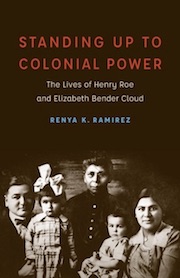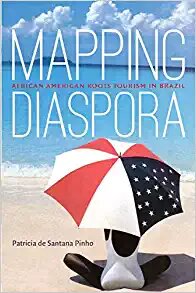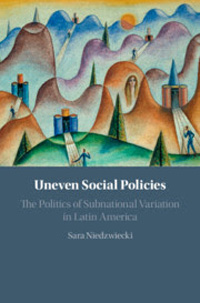Research Roundup highlights the work of faculty in the Division of Social Sciences who submitted citations in response to a call for submissions about recent publications. For ongoing coverage of UCSC research, please visit the UCSC Newscenter and In the News.
Anthropology
Assistant Professor Lars Fehren-Schmitz contributed to an article published in the journal Cell. The first analysis of high-quality ancient DNA data from Central and South America—from 49 individuals, some as old as 11,000 years—has revealed a major and previously unappreciated early population turnover. The study, Reconstructing the deep population history of Central and South America, was conducted by an international team that included researchers from the University of California, Santa Cruz, Harvard Medical School, and the Max Planck Institute for the Science of Human History. Their results show that a distinctive DNA type associated with the first widespread archaeological culture of North America (Clovis) was also found in Chile, Brazil, and Belize 9,000-11,000 years ago. https://news.ucsc.edu/2018/11/fehrenschmitz-dna.html
Fehren-Schmitz also contributed to an article in Science Advances, Current evidence allows multiple models for the peopling of the Americas, asserting that current evidence allows multiple models for the peopling of the Americas, in contrast to some recent academic and popular literature implying that the problem of the colonization of the Americas has been largely resolved in favor of one specific model: a Pacific coastal migration, dependent on high marine productivity, from the Bering Strait to South America, thousands of years before Clovis, the earliest widespread cultural manifestation south of the glacial ice.
Professor Emeritus Daniel Linger published an article, Memory Fields, in the peer reviewed journal Ethos which asks the question: how far can the nation-state reach into minds and reshape personal memories? Addressing this question requires a theoretical framework that can encompass public and personal representations of the past. Linger compares several additional cases drawn from the ethnographic and historical literatures, assessing the impact of the state’s memory-control tactics on personal memories. The article closes with a reflection on the emergent politics of memory in Donald Trump’s United States.
Associate Professor Andrew Mathews’ research in the mountainous region west of Florence, Italy, was featured in an article in Sapiens. In Surviving climate change in Italy, Mathews discusses practices that many people have abandoned—from caring for chestnut forests to clearing riverbeds— which may provide clues about how residents can prepare for the storms that are growing increasingly destructive as a result of climate change.
Assistant Professor Vicky Oelze participated in a new study entitled Food mechanical properties and isotopic signatures in forest versus savannah dwelling eastern chimpanzees, led by researchers from the Max Planck Institute for Evolutionary Anthropology in Leipzig, that analyzed the mechanical properties and the isotopic composition of plant foods eaten by chimpanzees living in the tropical forest and savannah woodland. https://news.ucsc.edu/2018/08/oelze-chimpanzees.html
Professor Renya Ramirez’s new book, Standing Up to Colonial Power, portrays her grandparents Henry and Elizabeth Cloud as "Christian warriors," individuals who dedicated their lives to educating and empowering Native youth, preserving Native culture, and holding the federal government accountable to tribal communities across the country. Decades before Wounded Knee and the occupation of Alcatraz, their activism sowed the seeds of what would come to be known as the Red Power Movement. https://news.ucsc.edu/2018/12/ramirez-book.html
Professor Tsim Schneider published a chapter in the edited volume, Forging Communities in Colonial Alta California, edited by Kathleen Hull (UC Merced) and John Douglass. Schneider’s chapter draws from his continuing archaeological and historical research in Marin County to understand how indigenous Coast Miwok people remained connected to homelands in the years after missionization (post-1830s) by creatively remaking their communities at different places across a broad region. A podcast interview with the volume’s editors and a discussion of the new book can be found here.
Professor Emeritus Adrienne Zihlman delivered the 29th annual Emeriti Faculty Research Lecture, The Inside Story of the Apes. Zihlman regaled the audience with tales of the meticulous dissection of Bwana, a beloved male silverback gorilla who had delighted visitors to the San Francisco Zoo for decades. She described her collaborations with renowned chimpanzee researcher Jane Goodall, and wrapped up with an anecdote about the day a crew of 15 animators from Walt Disney Studios immersed themselves in her lab as part of their preparation for the film Tarzan. https://news.ucsc.edu/2018/11/zihlman-lecture.html
Economics
Doctoral candidate Arshad Mirza and Professor Nirvikar Singh authored a paper entitled Mental health policy in India: Seven sets of questions and some answers. The article is forthcoming in The Journal of Mental Health Policy and Economics. The context of the analysis is the arguably poor state of mental health care in India, as well as an unprecedented level of policy attention to the issue. The paper argues that, while new laws and policies being introduced in India propose ideas and changes that are groundbreaking for that country, leading to cautious optimism, there still are many gaps in the understanding of the challenges of the provision of increased access to, as well as better quality of, mental health care throughout the country. These challenges can be understood on two fronts: one is the psychiatric and medical aspect of the issues, and the other is the management and administration of the system. On both fronts, training more practitioners with some expertise in mental health and giving existing practitioners better knowledge access will be crucial.
Education
Professor Judit Moschkovich published the journal article Using the academic literacy in mathematics framework to uncover multiple aspects of activity during peer mathematical discussions. This article, co-authored with W. Zahner (a UCSC graduate) illustrates how bilingual learners communicate about mathematical ideas during classroom discussions. The article analyses three aspects of students’ work during two mathematical discussions among middle school bilingual students, addressing the following questions: How does students’ work show evidence of mathematical proficiency? What disciplinary mathematical practices, (i.e. making sense of a problem, constructing arguments, looking for mathematical structure, etc.) do students use? and How do students use talk, gestures, and graphs to participate in a mathematical discussion?
Environmental Studies
Professor Chris Benner, Everett Program Director, and Director of the Institute for Social Transformation, coauthored the report From resistance to renewal: A 12-Step program for innovation and inclusion in the California economy. The authors assert in their report that California needs an economic "reboot" to promote innovation and inclusion within its own borders—and perhaps, as California often does, to lead the nation into a more equitable future. https://news.ucsc.edu/2018/11/benner-california.html
An op-ed about Benner’s proposed technology dividend was featured in the San Jose Mercury News.
Benner also led a study that reveals that nearly nine in ten jobs pay less today than they did 20 years ago, and shows that the tech sector has developed and propagated business models that give outsized rewards to a few top investors and executives, at the price of increasing financial insecurity for everyone else who contributes to the industry’s success. A report brief, Innovating inequality? How tech's business models concentrate wealth while shortchanging workers, is available online; the full report, Still walking the lifelong tightrope: Technology, insecurity and the future of work, is also online. https://news.ucsc.edu/2018/10/benner-tightrope.html
Professor Elliot Campbell penned an opinion piece for the San Francisco Chronicle, The darkness within a greening planet, about global greening theory, a process of increased amounts of carbon dioxide in the atmosphere potentially stimulating plant photosynthesis. A subsequent New York Times article commented on distorted uses of Campbell’s work on global greening.
Assistant Professor Madeleine Fairbairn was quoted in an article in Grist that discusses the negative impact of Harvard University’s investments in Brazilian farmland. This is enabled by the fact that Brazil’s land is concentrated among relatively few owners, making it possible for institutional investors to acquire large swaths of property with very few transactions.
Graduate student Juniper Harrower worked with Professor and Department Chair Greg Gilbert on her dissertation work, Context‐dependent mutualisms in the Joshua tree–yucca moth system shift along a climate gradient, that uncovered the reasons why Joshua trees may be squeezed out of the National Park that bears their name. Joshua trees are normally limited to a narrow elevation belt in the park where temperatures and moisture are just right, and models suggest that warming temperatures may eliminate suitable places for them to live in the park. Juniper found that Joshua trees are unable to thrive at lower, hotter elevations, and that the specialized moths that are needed to pollinate Joshua tree flowers and allow them to set seed are not active at the higher elevations. The obligate mutualism between moths and the Joshua trees is limited to that narrow belt where the Joshua trees grow best, and does not function at the edges of their range. That means the Joshua trees cannot reproduce by seed at the high elevations, as they would need to do to move up in elevation as temperatures rise in response to climate change. This is an important example of how climate change affects species distributions not only through direct effects but by affect the interactions between closely intertwined species. Harrower’s work on climate disruption in Joshua Tree was also featured in National Geographic.
Professor Karen Holl published an op-ed in the San Jose Mercury News calling on Congress to make sure industry cleans up the messes it makes on public lands.
Professor and Colleges Nine and Ten Provost Flora Lu just returned from India with Education Professor and Director of the Apprenticeship for Community Engaged Research (H)ACER at College Ten Linnea Beckett. Lu and Beckett were in India for a meeting of researchers on their new grant funded by NORFACE and Belmont Forum T2S (Transitions to Sustainability) entitled Transformations to Groundwater Sustainability: joint learnings from human-groundwater interactions.
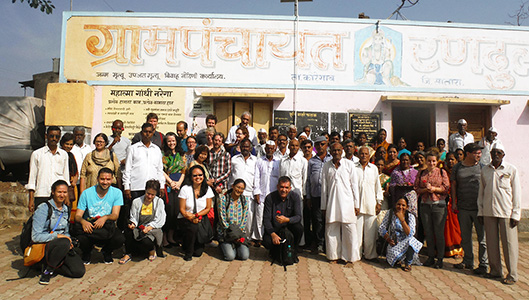 Professors Flora Lu and Linnea Beckett with research team in India.
Professors Flora Lu and Linnea Beckett with research team in India.
Professor Ravi Rajan and Danielle Crawfor edited The Technocene: Reflections on Bodies, Minds, and Markets by Hermínio Martins. This collection of important philosophical essays – a few previously unpublished – were written by Martins following his retirement from the University of Oxford. The essays address the ethical and societal consequences of the commoditization of the human body and mind.
Professor Chris Wilmers and a team of researchers published a paper in Science, Animals and the zoogeochemistry of the carbon cycle, which makes the case that the presence of wild animals can trigger direct or indirect feedback effects that alter a landscape’s capacity to absorb, release, or transport carbon. In reviewing a growing body of research, they find that animals can increase or decrease rates of biogeochemical processes by 15 to 250 percent or more. Failure to account for the role of animals can undermine the accuracy of any evaluation of ecosystem carbon budgets. They offer insights into how researchers might integrate animal ecology, ecosystem modeling, and remote sensing to more accurately predict and manage carbon cycling across landscapes. https://news.ucsc.edu/2018/12/wilmers-carbon.html
Assistant Professor Kai Zhu, was quoted in a story in NewsToday about public health impacts of climate change. Rising levels of carbon dioxide could make crops less nutritious, and damage the health of hundreds of millions of people, with those living in some of the world's poorest regions likely to be hardest hit.
Latin American and Latino Studies
Associate Research Scientist Peggy Estrada was featured in an article in Education Week, Older ELLs can face restricted learning opportunities. Estrada comments on the social stigma and low expectations tied to English-language-learner status, which often means that middle- and high school-age English-learners are linguistically and academically isolated with less access to a school's full curriculum and English-speaking peers.
Professor Patricia Pinho’s book, Mapping Diaspora: African American Roots Tourism in Brazil, was published in November by the University of North Carolina Press. Brazil, like some countries in Africa, has become a major destination for African American tourists seeking the cultural roots of the black Atlantic diaspora. Drawing on over a decade of ethnographic research as well as textual, visual, and archival sources, Patricia de Santana Pinho investigates African American roots tourism, a complex, poignant kind of travel that provides profound personal and collective meaning for those searching for black identity and heritage. It also provides, as Pinho’s interviews with Brazilian tour guides, state officials, and Afro-Brazilian activists reveal, economic and political rewards that support a structured industry. Pinho traces the origins of roots tourism to the late 1970s, when groups of black intellectuals, artists, and activists found themselves drawn especially to Bahia, the state that in previous centuries had absorbed the largest number of enslaved Africans. African Americans have become frequent travelers across what Pinho calls the "map of Africanness" that connects diasporic communities and stimulates transnational solidarities while simultaneously exposing the unevenness of the black diaspora. Roots tourism, Pinho finds, is a fertile site to examine the tensions between racial and national identities as well as the gendered dimensions of travel, particularly when women are the major roots-seekers.
Pinho also published an article, Turismos diaspóricos, for Tempo Social, the sociology journal of the University of São Paulo, Brazil. The article seeks to contribute to the study of diaspora tourism, which has attracted the interest of a growing number of visitors and researchers. Analyzing the intersections between tourism, diaspora, and race, the article has two main objectives: to map the major concepts that have been employed in the analyses of diaspora tourism, and to discuss some of its central questions. The presentation of the concepts does not have a mere taxonomic purpose, but seeks, instead, to generate tools that may contribute to deepen the analyses. The questions here discussed, on the other hand, although not accounting for the totality of the diaspora experiences of tourism, indicate some paths to be followed in these studies, such as the analysis of the connections between tourism and identity, the hierarchies inherent to diasporas, and the paradox of the privileged mobility of tourists who belong to racially subordinated groups.
Professor Cat Ramirez’s book, The Woman in the Zoot Suit, was referenced in a feature in the Washington Post about the significance of Lady Gaga choosing to wear a suit to a recent honorary event in Hollywood.
Politics
Associate Professor Liz Beaumont was asked to contribute her thoughts in the New York Times about what we can do, post-election, about climate change.
Associate Professor Sikina Jinnah, Simon Nicholson and Jane Flegal will publish an article (forthcoming December 2018) entitled Toward Legitimate Governance of Solar Geoengineering Research: A Role of Sub-State Actors published in Ethics, Policy and Environment. Two recently proposed solar radiation management (SRM) experiments in the United States have highlighted the need for governance mechanisms to guide SRM research. This paper draws on the literatures on legitimacy in global governance, responsible innovation, and experimental governance to argue that public engagement is a necessary (but not sufficient) condition for any legitimate SRM governance regime. We argue that in the absence of federal leadership, U.S. states, such as California, New York, and other existing leaders in climate governance more broadly have an important role to play in the near-term development of SRM research governance. Specifically, we propose that one or more U.S. states should establish a new interdisciplinary advisory commission to oversee and review the governance of SRM research in their states. Centrally, we propose that state-level advisory commissions on SRM research could help build legitimacy in SRM research decisions through the inclusion of, at minimum: meaningful public engagement early in the research design process; an iterative and reflexive mechanism for learning and improving both participatory governance mechanisms and broader SRM governance goals over time; as well as mechanisms for adaptation and diffusion of governance mechanisms across jurisdictions and scales.
Jinnah also contributed to the report, Governing Solar Radiation Management. This report details the twelve concrete recommendations for the anticipatory governance of solar geoengineering. These recommendations, we argue, that should be implemented in the near term (i.e. before 2025) to govern early-stage research and ensure robust social consideration of that research, all with an eye to building a foundation for any possible consideration of solar geoengineering deployment in future. These recommendations fall into three non-mutually exclusive categories: create politically legitimate deliberative bodies, leverage existing institutions, and make research transparent and accountable.
Researcher and Lecturer Ruth Langridge contributed to the Central Coast Summary Report, a regional report for California’s Fourth Climate Change Assessment. The Central Coast Region Summary Report presents an overview of climate science, specific strategies to adapt to climate impacts, and key research gaps needed to spur additional progress on safeguarding the Central Coast Region from climate change. It translates the state of climate science into useful information for decision-makers and practitioners to catalyze action that will benefit regions, the ocean and coast, frontline communities, and tribal and indigenous communities. The Report is part of a series of 12 assessments to support climate action by providing an overview of climate-related risks and adaptation strategies tailored to specific regions and themes. It is a component of California’s Fourth Climate Change Assessment by leading climate experts that advances actionable science that serves the growing needs of state and local-level decision-makers from a variety of sectors. Ruth Langridge, Researcher in the Department of Politics, UC Santa Cruz, was the Lead and Coordinating author, and the report contained contributions from over 20 experts including eight from UC Santa Cruz. The report’s findings were presented in a joint workshop at UC Santa Cruz on December 10 with a virtual link to a UC San Luis Obispo audience.
Langridge also contributed to another report for California’s Fourth Climate Assessment’s Technical, that examines how groundwater management agencies are planning for drought and new approaches that are currently being used that show promise for addressing the impacts of higher temperatures and more extreme droughts that are projected for California in the next century.
Additionally, Langridge co-authored a report that explores the management of groundwater, a common pool resource, by two distinct institutions – a court adjudicated groundwater basin that focuses of water rights -- and a legislatively created groundwater district with a collective public management focus.
Associate Professor Mark Massoud's article, How an Islamic State Rejected Islamic Law, appears in the Fall 2018 issue of the American Journal of Comparative Law (AJCL), the journal of the American Society of Comparative Law. The article uses the case of Sudan's 1956 transition to independence to ask why a Muslim-majority state would reject Islamic law, rather than enact it, as the basis of its legal system.
Massoud also published Reflections on the Future of Global Legal Studies, which shares his ideas on interdisciplinary research, teaching and mentoring, and service in the law and society community. It's the lead article in a symposium celebrating the 25th anniversary of the Indiana Journal of Global Legal Studies.
Assistant Professor Sara Niedzwiecki’s book, Uneven Social Policies was published by Cambridge University Press in August. Niedzwiecki’s research explores the variation in political motivations, state capacity, and policy legacies, across provinces and municipalities, combining case studies with statistical analysis of conditional cash transfers and health policies in two decentralized countries, Argentina and Brazil. Uneven Social Policies shifts the focus of welfare state analysis away from policy design and toward policy implementation, and explains why some policies are implemented more effectively than others, why some deliver votes to incumbent governments while others do not, and why regionally elected executives block the implementation of some but not all national policies.
Professor Daniel Wirls wrote an opinion editorial for the San Francisco Chronicle on the Democratic Party’s lack of opposition to the inflation of national defense spending.
Wirls also penned an opinion editorial for The Conversation, advocating for elimination of the Senate 60-vote majority rule.
Psychology
Professor Nameera Akhtar published a journal article in Behavioral and Brain Sciences, entitled Being vs appearing socially uninterested: Challenging assumptions about social motivation in autism. Although conventional wisdom holds that autistic people don't want to connect with others, Akhtar believes this is almost certainly wrong. She writes that this persistent popular belief is based on a "misreading" of behaviors associated with autism, including a reluctance to make eye contact, repetitive speech, and body movements that others find off-putting. Rather, she says, neurological characteristics underlie these "unsociable" behaviors. This societal "misreading" can have devastating consequences, because it dehumanizes people with autism. https://news.ucsc.edu/2018/06/akhtar-autism.html
Akhtar also coauthored a New York Times opinion piece about her recent research, How to meet autistic people halfway.
Assistant Professor Courtney Bonam has explored the assumptions people make about neighborhoods and schools that are either predominantly black or white and has uncovered racial bias in the way people perceive communities. An early experiment revealed that people attribute negative characteristics to black neighborhoods, including "crime-ridden," "rundown," and "impoverished." By contrast, white neighborhoods were described as "safe," "well-maintained," and "wealthy." More recent work yielded similar splits whether people were asked to describe black and white areas that are middle-class or lower-class. Her research was covered by Slate in Black space, white blindness. https://news.ucsc.edu/2018/11/bonam-housing.html
Professor Nicolas Davidenko and Alumnus Alexander Ambard co-authored a paper, Reading sideways: Effects of egocentric and environmental orientation in a lexical decision task. In this work, they demonstrated that people's ability to read words at different orientations depends on their own body tilt. When participants sit upright, they are fastest to detect words (e.g. candid) from jumbled non-words (e.g. dincad) when the words are presented upright, and recognition speed gradually decreases as words are rotated away from upright. However, when participants are lying sideways, their fastest reading speeds are achieved when words appear at around 15 degrees from the participant's perspective. This research adds to the growing evidence that environmental and gravitational factors contribute to orientation-dependent visual processing. Their results also have implications for the design of wearable media such that it can be adapted to viewing from non-upright positions.
Professor Phil Hammack is the lead author of Queer intimacies: A new paradigm for the study of relationship diversity, an article that appears in the current online edition of The Journal of Sex Research. By "queer intimacies," Hammack means any and all intimate relationships that challenge norms, and notes that the use of 'queer' actually originated at UC Santa Cruz with the phrase 'queer theory' in 1990. Hammack's coauthors on the article are David Frost, associate professor of social psychology at University College London, and Sam Hughes, a graduate student at UC Santa Cruz. https://news.ucsc.edu/2018/11/hammack-relationships.html
Professor Regina Langhout’s work on deportation was featured on a KAZU report and picked up by KQED Radio. The study found that deportations dramatically increased during the Clinton, Bush and Obama administrations. Most those being deported had lived in the country for more than a decade. The study also found this creates fear, anxiety and ripple effects, including mistrust in public institutions.
Langhout also wrote an opinion editorial for the Santa Cruz Sentinel on the impacts of deportation, and what the Santa Cruz community can do in its wake.
Professor and Department Chair Campbell Leaper published two theoretical papers addressing how sexism may affect academic achievement. In the Psychology of Men & Masculinity, Leaper and his graduate students reported a study of high school students that was designed to test how endorsement of traditional masculinity ideology (toughness, emotional restriction) might be related to the average lower achievement in reading and writing among boys relative to girls. In support of their hypothesis, Leaper and his graduate students found that boys who endorsed traditional masculinity ideology were more likely to avoid help in English classes, which in turn predicted lower grades. The same pattern did not predict boys’ math grades. The research challenges the view of some critics who have argued that boys’ lower average academic performance is due to the “feminization” of boys in schools. Instead, it suggests that excessive concerns with maintaining dominance may undermine many boys’ academic success.
In another study appearing in Psychology of Women Quarterly, Leaper and graduate student Christy Starr investigated undergraduate women’s experiences with sexual harassment and gender bias in relation to their motivation STEM. They also considered positive experiences in the forms of support from family or friends for STEM. Students were enrolled in gateway biology courses for majors. Participants reported how often they experienced sexual harassment or STEM-related gender bias (such as negative comments about women in STEM) during the past year from teachers (instructors, teaching assistants, or graduate students) or from classmates. Frequency of sexual harassment from teachers and gender bias from classmates predicted lower STEM motivation and STEM career aspirations even after taking into account grade point averages. Sexual harassment from teachers may damage women’s trust in the institution, whereas gender bias from classmates may undermine their sense of belongingness in the discipline. However, the study also indicated that experiencing support from friends for STEM achievement was positively related to STEM motivation and career aspirations after taking into account the experiences with discrimination. Leaper and his colleagues suggest the research underscores the needs, first, for education about sexism and discrimination and, second, for supporting organizations that can foster a sense of belonging, such as the Women in Science and Engineering (WiSE) on campus.
Leaper was interviewed and quoted for an article on Beyond ‘no means no’: How to talk to teenage boys about consent in the Washington Post. The article appeared at the cusp of the Brett M. Kavanaugh hearings. Leaper addressed the problematic nature of single-gender schools (that Brett Kavanaugh and his peers had attended). Separating youth by gender exaggerates the sense that the other gender is viewed as an outgroup. And it makes it more difficult for boys and girls to relate to one another as equals. Moreover, these problems are often aggravated when alcohol is added to the mix.
Professor Barbara Rogoff and her colleagues recently published their research on sophisticated collaboration among Mexican-heritage children in the Proceedings of the National Academy of Sciences. In light of calls for improving people’s skill in collaboration, this paper examines strengths in processes of collaboration of Mexican immigrant children. Sibling pairs (6–10 years old) in California were asked to collaborate in planning the shortest route through a model grocery store. On average, 14 sibling pairs with Mexican Indigenous-heritage backgrounds engaged together collaboratively as an ensemble, making decisions in common and fluidly building on each other’s ideas, more often than 16 middle-class European American sibling pairs, who on average more often divided decision making into a solo activity (often ignoring the other or simply bossing the other). Siblings who spent more time collaborating fluidly as an ensemble in the shared planning task were also more likely to collaborate with initiative at home, according to their mothers, which suggests that family socialization practices may contribute to cultural differences in collaboration.
Rogoff and colleagues also examined shared thinking through collaboration and distinguished it from negotiation. This paper contrasts two ways that shared thinking can be conceptualized: as negotiation, where individuals join their separate ideas, or collaboration, as people mutually engage together in a unified process, as an ensemble. They argue that these paradigms are culturally based, with the negotiation model fitting within an assumption system of separate entities — an assumption system the authors believe to be common in psychology and in middle-class European American society — and the collaboration model fitting within a holistic worldview that appears to be common in Indigenous-heritage communities of the Americas. Rogoff and colleagues discuss cultural differences in children's interactions — as negotiation or collaboration — that suggest how these distinct paradigms develop.
Professor Eileen Zurbriggen published an opinion article for the Santa Cruz Sentinel on the ways that men can help prevent rape, following the testimony by Christine Blasey Ford during the Senate’s hearings on supreme court nominee Brett M. Kavanaugh.
Sociology
Professor Lindsey Dillon, along with Dawn Walker, Eric Nost, Aaron Lemelin, and Rebecca Lave published Practicing environmental data justice: From DataRescue to data together in Geo: Geography and Environment. In this paper, the authors reflect on the changing nature of The Environmental Data and Governance Initiative’s (EDGI) grassroots data archiving work, from a project to “save” government environmental data to a broader project of rethinking the infrastructures required for community stewardship of data.
Dillon published a chapter, Crossroads in San Francisco: The Naval Radiological Defense Laboratory and its Afterlives, in Inevitably Toxic? Historical Perspectives on Contamination, Exposure, and Expertise, by Brinda Sarathy, Vivien Hamilton, and Janet Farrell Brodie (eds).
Dillon also authored an opinion article for The Conversation about the Environmental Protection Agency under the Trump administration, and penned a letter in The New Yorker, addressing racism in the building of San Francisco.
Media coverage of Dillon’s research included an interview in Bay Nature, Do parks push people out? and a panel discussion available as a podcast by KALW City Visions, Will the Hunters Point shipyard ever be habitable?
Professor Hiroshi Fukurai, president of the Asian Law and Society Association (ALSA), opened the Asian Law and Society Association Conference at Bond University in the Gold Coast, Australia in November. This year’s ALSA Conference attracted scholars from over 20 countries across the globe, including the Philippines, Afghanistan, India, Indonesia, Malaysia, Thailand, Vietnam, Georgia, Vanuatu, Hong Kong, and Macau, as well as the US, Japan, Canada, Australia, South Korea, mainland China, Taiwan, Singapore, Germany, Sweden, Poland, the Czech Republic and others. Panelists and participants represented 16 institutions among 38 Australian law schools.
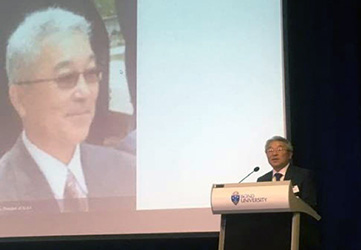 Professor Hiroshi Fukurai’s opening address, Asian Law and Society Association Conference.
Professor Hiroshi Fukurai’s opening address, Asian Law and Society Association Conference.
Professors Miriam Greenberg and Steve McKay co-lead efforts to study and address the housing crisis in Santa Cruz. The No Place Like Home project was presented in a public event at the Santa Cruz Civic Center in October. Mckay and Greenberg’s work was also featured in a report in Good Times Santa Cruz about the factors driving Santa Cruz’s housing crisis. https://news.ucsc.edu/2018/10/mckay-home.html
McKay and Greenberg also wrote an op-ed for the Santa Cruz Sentinel about the opportunity created by the housing crisis.
Professor Rebecca London completed a collaborative research project with Santa Cruz City Schools to explore break time at middle schools. London worked with a team of 25 undergraduate students, a doctoral student, and a high school intern to collect observations and interviews at seven local schools. The study, It’s Not Called Recess Anymore: Safe, Healthy and Productive Break Time in Middle School, examines the kinds of activities middle school students engage in during their breaks and their alignment with middle schoolers' developmental needs. It explores institutional approaches to supporting break time for students and students' own interests for that time. Findings have ramifications for the school district's programming to improve school climate and contribute to the literatures that examine physical activity, bullying, positive youth development, and equity in schools. Importantly, the project also offered an opportunity for Sociology students to gain experience conducting original field research in a supported setting.
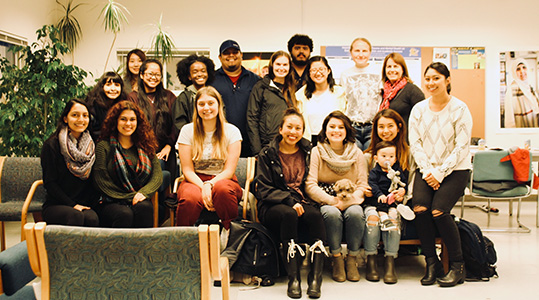 Professor Rebecca London and students who collaborated on research project.
Professor Rebecca London and students who collaborated on research project.
Professor Katharyne Mitchell, Dean of the Social Sciences Division, was interviewed by the Economist for a feature on churches providing refuge to vulnerable immigrants as part of the Sanctuary movement in Europe.
Professor Juan M. Pedroza penned an article for the Policy Studies Journal on deportation. As deportations from the United States rose to unprecedented levels, a nationwide immigration enforcement program Secure Communities helped identify deportable noncitizens under arrest in county jails. Examining county-level variation in deportation activity between 2008 and 2013, this paper contributes to immigration policy research by examining how county officials in some locations facilitated exceptionally restrictive deportation outcomes while others exercised the discretion to turn noncitizens over for deportation sparingly. Consistent with a hypothesized “tiered influence” relationship, but contrary to a “racial threat” hypothesis, Hispanic concentration predicts the highest levels of exercised discretion where Hispanic concentration is neither too small nor too large. Noncitizens under arrest seem to have benefited from above-average Hispanic concentrations, except in counties where Hispanics exceed about 40 percent of the population. https://news.ucsc.edu/2018/12/pedroza-deportation.html
In September, Buzzfeed News covered Pedroza’s studies on immigration scams.
Associate Professor Veronica Terriquez, whose research focuses on youth civic engagement, worked with UCSC students and recent graduates on the Central Valley Freedom Summer Project, modeled after Freedom Summer, the Mississippi voter-registration drive that began in 1964. Many of the students in the 60’s who supported the Civil Rights Movement didn’t originate from the south, and when they left, they took their energy and talent with them. Terriquez wanted to support a different movement in the Central Valley, one that would build on the undergraduates' deep ties to their hometowns. https://news.ucsc.edu/2018/10/terriquez-summer.html
KQED reported on the project’s efforts. KVPR, Central Valley’s Public radio station, also published coverage on the project.
Additionally, Terriquez penned an opinion piece for the Los Angeles Times about increasing youth voter turnout.
Social Sciences Division
Alumna Madison Barbour and Professor Julie Guthman co-authored a report discussing the USEPA's new Worker Protection Standard for farmworkers, which largely focused on improving the information provided for farmworkers, including the hazards of working while pregnant. This report draws on 55 interviews with farmworkers that Guthman’s project team conducted as part of her NSF-funded project on fumigation use in California's strawberry industry. Barbour's analysis of these interviews sheds light on the practical fallacies of an information-oriented regulatory program when most farm workers feel that not working is the bigger risk. Guthman and Barbour found that farmworker men and women already recognized the potential dangers of pesticide exposure without additional notification, yet farmworker women felt even more limited in their ability to protect themselves from exposure at the workplace. Farmworkers who worked during their pregnancies felt particularly at risk.
Drawing on her NSF-funded strawberry research, Guthman penned an article for the Breakthrough Institute on the sustainability trade-offs in the industry, as strawberry growers are being pushed to develop alternatives to chemical fumigation as a way to control soil borne pathogens.
Guthman and Melina Packer co-authored a chapter of Food and Obesity; Twenty Lessons in the Sociology of Food and Agriculture, by Maki Hatanaka and Jason Konefal, eds. Oxford University Press. This book chapter draws from Guthman’s previous book, Weighing In (2011) to critically examine four different assumptions that underpin the "food system" perspective on obesity. Intended to bring focus to structural causes of obesity, this perspective, while improving on "personal responsibility" models, may still lead to misguided solutions.
